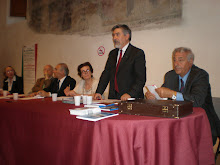MATERIALI PER TESI DI LAUREA E SVILUPPI
La Newsletter dell'Institute for Economics & Peace del 26 aprile 2022 riporta i seguenti report:
Scientists are creating new techniques to grow seaweed. Several European countries are focusing on innovating seaweed plantations. Researchers say that seaweed could be a key product to substitute meat, as it contains protein and its environmental impact is less as other similar products such as soy.
Researchers develop electric chopsticks to reduce salt intake in Japan. The chopsticks generate a current that attracts sodium particles inside food to make it taste saltier by 1.5 times. The average adult consumes double the recommended amount of salt in Japan.
Facebook pivots to fiber optics in Africa as it meets resistance in the West. The company has increasingly focused on less regulated markets such as Nigeria as its data harvesting practices come under question elsewhere. While Facebook loses money on the cables, it is betting on massive amounts of monetisable user data down the road.
Peru's Castillo hardens stance on mining protests as economy stumbles. Peru's President has signaled a tougher stance on protests against mining companies in Peru, the world's second largest copper producer, mobilising the army in a sharp tactical shift from a previous conciliatory approach.
Portuguese-Danish-Dutch consortium plans $1.1bn hydrogen plant in Sines. The companies said the plant would include a 500-megawatt electrolyser to produce 50,000 tonnes of green hydrogen and 500,000 tonnes of green ammonia per year.
Bacteria relating to prostate cancer could bring breakthroughs for prevention and treatment. Scientists have discovered five species of bacteria linked to rapid progression of the disease. With this information, scientists could develop tests to identify men most at risk and potentially find medicines that prevent the cancer from killing thousands every year.
Per info: ricerca.cesvam@istitutonastroazzurro.org
per approfondimenti su CESVAM










Nessun commento:
Posta un commento